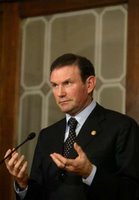
Two young boys dress up as Momotxorros, a local mountain animal, as they run across a field during a carnival celebration in Alsasua, northern Spain, Tuesday, Feb. 28, 2006. (AP Photo/Alvaro Barrientos)

Basque political prisoner Igor Angulo (Bilbao 1974) was found dead today hanging from his cell window in Cuenca's jail (more than 600 kilometers from the Basque Country). He was the only Basque political prisoner in Cuenca. Because of the Spanish dispersal policy before he was transferred to Cuenca in 2001. He was kept in six different jails all around Spain. He was locked in his cell for 18 hours a day. He was tortured when he was arrested in 1996.
He is the third Basque political prisoner to be found dead in his cell in the last year and we want to make clear to everybody that this is a consequence of the merciless and brutal Spanish and French governments’ prison policy against Basques. More than 700 Basque political prisoners are kept in 80 prisons all around France and Spain suffering beatings, isolation, medical mistreatment, dispersal and being denided the most basic rights like education, speaking in Basque...etc.
If the Spanish and French governments are to be considered seriously about their aims towards a political resolution of the conflict they have to change radically their cruel policy against Basque political prisoners and stop treating them as political hostages.

Villarreal's goalkeeper Javier Lopez Vallejo saves a penalty during a Spanish league soccer match against Athletic Bilbao at the San Mames stadium in Bilbao, Spain, Sunday Feb. 26, 2006. The game ended 1-1. Athletic Bilbao fans in background can be seen with banners supporting the Basque separatist group ETA, urging the return of all ETA prisoners to the Basque country. (AP Photo/Juan Manuel Serrano)

Athletic Bilbao's players observe a minute of silence for Spanish striker Telmo Zarra, who died on Thursday, before their Spanish first division soccer match against Villarreal at Bilbao's San Mames stadium, northern Spain February 26, 2006. The match ended in a 1-1 draw. REUTERS/Victor Fraile


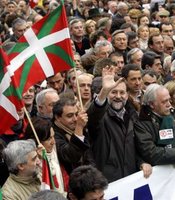


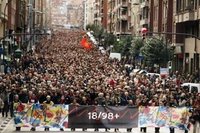
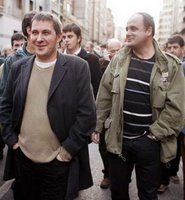
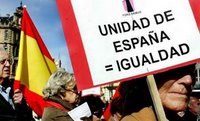




BARCELONA - They have their own language, their own culture, and a history of rebellion going back more than 500 years. They have had periods of semi-independence punctuated by brutal government crackdowns. They have a vibrant economy that is the envy of their country. And they're determined to become their own nation.
It is a picture that fits any number of armed separatist movements around the world. Here, it describes a peaceful drive for more autonomy in the Spanish region of Catalonia, and it is nearing success with the backing of the country's Socialist prime minister, José Luis Rodríguez Zapatero.
Opponents say the plan for more self-rule is a Trojan horse, paving the way for full independence, striking at the foundation of Spain's 28-year-old democracy and threatening to break up the country. Francesc Vendrell, a spokesman in Catalonia for the opposition Popular Party, calls it unconstitutional. ''If the current proposal is approved,'' he said, the effect would be to give the Basque region "a basis for independence.''
But supporters say the legislation could achieve just the opposite by giving the Basque separatist group ETA, which Spain and the United States label a terrorist organization, a peaceful alternative to its bloody 45-year-old campaign for independence of Basque areas west of Catalonia. More than 800 people have died in that violence.
''The move for independence will grow if the Catalan statute is not approved,'' said Pasqual Maragall, president of Catalonia, a region of about 7 million people centered around the cosmopolitan Mediterranean city of Barcelona. ''It's a cautious, ambitious, but very clever and acceptable approach to the Basque question,'' Spain's most intractable problem.
Conservative and nationalist opposition to the plan, which analysts predict parliament will pass in modified form in a few months, has been intense. A countrywide boycott was launched against Catalan goods, particularly its famous Cava sparkling wine, and the Popular Party accused Zapatero's government of fomenting the Balkanization of Spain.
Lt. Gen. José Mena Aguado was fired as head of land forces after warning of ''serious consequences'' if the law were passed. He also cited a clause in the constitution permitting the armed forces to intervene to guarantee the unity and sovereignty of Spain.
Army Maj. Tomas Torres Peral later criticized the firing in a newspaper opinion piece, asking, "Can one, must one, be neutral when it comes to defending the constitution?''
The remarks, which recalled Gen. Francisco Franco's four decades of military dictatorship, stunned Spaniards across the political spectrum, and underscored how polarizing the issue has become.
''In the long run, if this goes forward, we will have a war among us,'' said Antonio Valor, 67, a retired auto worker who moved to Barcelona when he was 23. "Spain is only one nation with one flag, and that's how to avoid a civil war.''
The autonomy bid has transfixed Spain ever since the Catalonian parliament voted overwhelmingly to become a ''nation'' -- but still remain a part of the country -- last September, and then forwarded the proposal to the Spanish parliament in Madrid.
Zapatero's two-year-old government embraced the concept but insisted on changes that were still being negotiated. Polls predict easy passage.
José Luiz Pérez, an economic consultant in Madrid, said Zapatero's minority government relied in parliament on small regional parties that wanted the measure. So ''his hands are tied'' on this issue, Perez said. "It's for survival.''
Supporters of the idea said it was a matter of good governance and common sense. ''We're moving toward a system like in the United States, where a person is a citizen of a state and of the country, too,'' said Jose Lopez, 52, a news vendor in Barcelona "It's not going to break up the country.''
Fernando Moraleda, the government's top spokesman, denied that Zapatero was pandering to fringe parties to keep his coalition afloat. The spokesman noted that other regions were also exploring autonomy bills, including Andalusia in the south, Galicia in the far northwest, and Valencia along the central Mediterranean coast.
''The country has functioned better with decentralization, and we're trying to give a new push to a society that has changed,'' Moraleda said. "We share a common project that will improve the more we recognize the differences that unite us.''
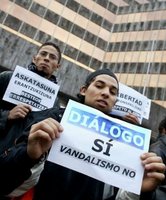
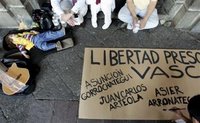
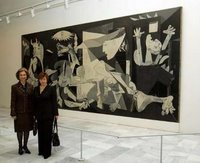
Spain's Queen Sofia (L) poses with Lyudmila, wife of Russia's President Vladimir Putin in front of Pablo Picasso's Guernica mural in Madrid's Reina Sofia museum February 9, 2006. Putin is in Spain on a two-day state visit. REUTERS/Andrea Comas
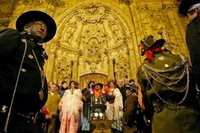
Story by: Jill Boudreaux
2/2/2006
Richard Siegel, University of Nevada, Reno political science professor emeritus and president of the American Civil Liberties Union of Nevada, will be giving human rights lectures February 13 and 15, 2006 at a conference on world affairs organized and hosted by the University of the Basque Country in Bilbao, Spain.
“There are several similarities between Spanish human rights issues and U.S. human rights issues,” Siegel said. “I am interested in sharing the American experience with conference participants.”
The first lecture will take place February 13 and will address the “international human rights regime today.” He will focus on the overall global and regional systems that attempt to protect human rights around the world.
The second lecture on February 15 will be a comparative lecture looking at U.S. and Spanish human rights policy in relation to terrorism, national autonomy, torture, the death penalty and other issues.
Carmelo Urza, director of the University Studies Abroad Consortium (USAC), said there is a long-standing working relationship between the University of Nevada, Reno and the University of the Basque Country.
“Our studies abroad program began at the University of the Basque Country in 1982,” Urza said. “I felt Rich would make a great presenter for this conference thanks to his dedication to human rights issues here in Nevada.”
Siegel has previously lectured on human rights issues in China, South Africa and England.
I'll say, this is excellent news.
.... ... .
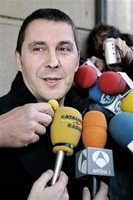
Those characteristics were the pride of former City Councilman Mike Dieguez.
His many friends and co-workers remember him as a great person with the city, especially the 1st Ward, in his heart.
Dieguez died Sunday at Valley Hospice Palliative Care at age 84.
Dieguez had served for 26 years on council and had been retired from city government for several years, but that didn't mean he gave up his interest in the operations in the Municipal Building and the City Annex Building.
Dieguez often would ask his friends who are still in government what was going on.
His friends also recount Dieguez's tales of being a boxer in the service, and his constant discussion of Basque history.
He was proud that he was one of the world's true Basque descendents. Basques are people who live in the areas of Eastern Spain and Western France, along the border, with their own special language and heritage. He even had a license plate that proclaimed his Basque heritage.
Fifth Ward Councilwoman Deborah Welsch recalls when she started as council clerk in the late 1980s that she was concerned how to pronounce the 1st Ward councilman's name. Was it the Americanized "DEE-kez" or the Spanish "Dee-yeah-gez"?
"He was so proud of his Spanish heritage," Welsch said. "From then on, whenever I called on him in council, I said the Spanish pronunciation."
